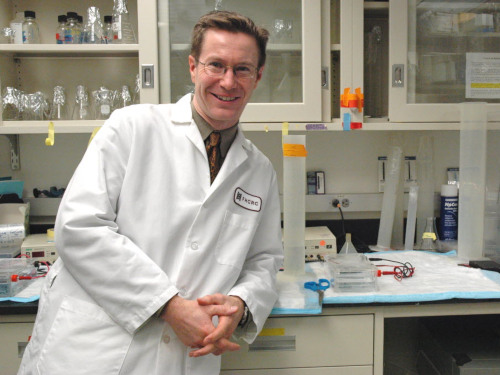SUBSCRIBE TO THE FREE NEWSLETTER
The search for an HIV cure in Seattle
Seattle’s Fred Hutchinson center is best known for its work on cancer, but scientists there are also working on a cure for HIV, and in the past several years have been making big steps toward that goal, Niki Stojnic reports in a feature online now at Cascadia Magazine.
After years of frustrating false leads, HIV-positive people have seen hopes dashed, but now scientists may be getting closer than ever before. Stojnic talks with a virologist and advocates for people with HIV about the possible pathway to a cure.
You’ll meet Tranisha Arzah, who grew up in Port Townsend, WA and has lived with HIV since childhood, and now works supporting and advocating for HIV-positive women. She also volunteers with an organization that helps scientists better understand the needs of the HIV+ community.
You’ll also meet Keith Jerome, a virologist at Fred Hutch who co-leads defeatHIV, which is investigating three promising approaches to a cure. But it’s still an uphill battle: “it’s a sneaky virus,” Jerome says.
And you’ll hear from Michael Louella, an advocate for the HIV-positive community. Years of disappointments have left many who live with the disease skeptical, but hope is rising, and Louella notes that a cure would mean freedom for those who have HIV: “Freedom from the virus, from taking a pill every day; freedom from so much for people.”
Read the full article at Cascadia Magazine online here.
And if you appreciate great reporting like this, please take a moment to visit our donate page and make a contribution at any level you’re comfortable with.
Cascadia Magazine original: two poems by Samuel Green
“This was the year the elk swam
to the island, a stray bull turned out
of its Cascade herd & somehow
kicked its way across a mile of saltwater
currents…”
Former Washington state poet laureate Samuel Green who lives in the San Juan Islands, has two poems online now at Cascadia Magazine about human interactions with wildlife: “Falcon Watching, Disney Point,” and “Elk.” Take a moment to read them here.
Critical Nanaimo election today
CBC reports on the critical by-election today that could tip the balance of power in the British Columbia legislature, with a special election for an empty seat in the Nanaimo area. If the center-right Liberals win the seat, the BC legislature will have a 42-42 tie, and independent legislator Daryl Plecas would hold the deciding vote, imperiling the NDP-Green coalition. The Georgia Straight notes that the NDP could have avoided the mess by appointing Leonard Krog to a cabinet post — instead he left his seat to run for and become Nanaimo’s mayor.
Nonprofit helps minority-owned cannabis businesses in Oregon
Willamette Week reports on the nonprofit NuLeaf, which is helping black-owned legal pot businesses in Portland prosper in order to address the issue of equity in the cannabis industry. More on the NuLeaf can be found here. For more on the issue of equity the legal weed industry read this feature published last year at Cascadia Magazine. In related news, WA is debating a law to make home-grown pot legal.
Why did Washington’s carbon tax fail?
Kate Schimel, writing for High Country News, has a detailed post-mortem of Washington’s failed ballot initiative 1631, which would have created the first carbon tax in the US. In addition to massive spending by fossil fuel companies, proponents may have misjudged how the state’s green image is hollow: “In Washington, we’re excited to support environmental action, as long as we don’t have to pay for it,” says one observer. Speaking of which, the WA legislature is looking to pass a plastic bag and straw ban.
Sunflower starfish endangered by wasting disease
Lynda Mapes at the Seattle Times looks at a new report by biologists that attributes a devastating disease affecting sunflower starfish on the coast of Cascadia to climate change and rising sea temperatures. Numbers of the huge sea stars have plummeted in just a few years. Said one biologist “I don’t know the words to describe it, these things were as common as a robin in our ecosystem.”
Multimedia artist Jojo Abot’s residency in Eugene
Eugene Weekly talks with Ghanian musician and visual artist Jojo Abot, who was awarded a residency with the Hult Center in Eugene. Utilizing vivid colors and performing music described as “Afro-hypno-sonic,” Abot is shaking up Eugene’s artistic scene.
Poetry by Karen Finneyfrock
At Seattle Review of Books, read “While Reciting Robert Hayden,” a poignant story of teaching Hayden’s poem “Those Winter Sundays,” and being interrupted by a school lockdown:
“…Pink sneakers tuck under tables, followed by little
combat boots. When the teacher turns the blinds I sink down wondering where
to put my hands. The classroom door is before me…” Read the full poem here.
That’s today’s assortment of news, arts & culture from across the Cascadia bioregion. If you like what you read here, please take a moment and visit our donate page to make a contribution. Have a great evening! –Andrew Engelson
Photo credit: Keith Jerome courtesy of Fred Hutchinson Cancer Research Center

